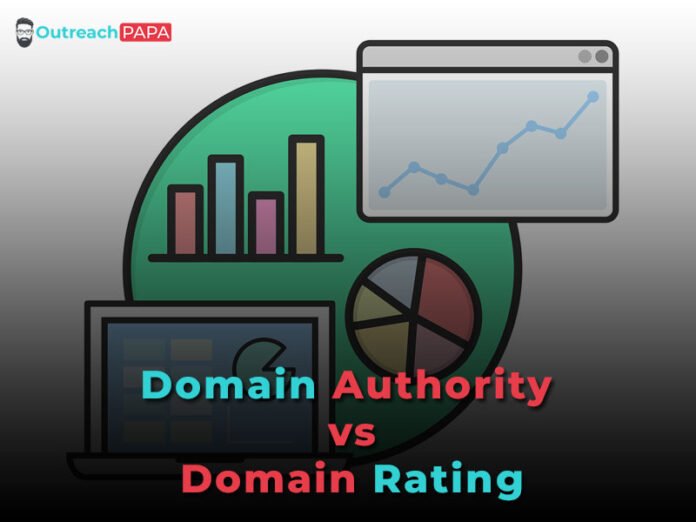When it comes to improving search engine rankings and establishing a strong online presence, understanding the key metrics in SEO is crucial. Two commonly used metrics are Domain Authority (DA) and Domain Rating (DR).
In this article, we will explore the differences between Domain Authority and Domain Rating, how they are calculated, and their significance in search engine optimization. By the end, you will have a clear understanding of these metrics and how they can impact your website’s performance.
What is Domain Authority?
Domain Authority, developed by Moz, is a metric that predicts how well a website will rank on search engine result pages (SERPs). It is represented on a scale of 1 to 100, with higher scores indicating a greater ability to rank. DA takes into account various factors like the number of high-quality backlinks, the overall link profile, and other SEO signals. It serves as a comparative metric to evaluate the authority and credibility of a website.
Understanding Domain Rating
Domain Rating, on the other hand, is a metric provided by Ahrefs, another prominent SEO tool. Similar to Domain Authority, it measures the strength of a website’s backlink profile. However, it is represented on a scale of 1 to 100, with higher values indicating a stronger backlink profile and a greater potential to rank higher on SERPs. A website with a higher DR typically has more high-quality and authoritative backlinks pointing to it.
Calculating Domain Authority
Domain Authority is calculated using a complex algorithm that analyzes multiple factors. While the specific details of the algorithm are not disclosed by Moz, some key factors include the total number of backlinks, the quality of those backlinks, the diversity of link sources, and the overall link profile of the website. Websites with a strong and diverse backlink profile from authoritative sources tend to have higher DA scores.
Determining Domain Rating
Domain Rating is calculated by Ahrefs using its own proprietary algorithm. It primarily focuses on the quantity and quality of backlinks pointing to a website. Ahrefs considers factors such as the number of unique referring domains, the authority of those domains, the relevance of the linking pages, and the overall backlink profile of the website. By analyzing these factors, Ahrefs assigns a DR score to each website.
Importance of Domain Authority and Domain Rating
Both Domain Authority and Domain Rating are valuable metrics for evaluating the credibility and authority of a website. They help website owners and SEO professionals gauge the potential ranking ability of their site compared to competitors. These metrics provide insights into the quality and strength of a website’s backlink profile, which is a crucial factor in determining search engine rankings.
Differences between Domain Authority and Domain Rating
Although both metrics serve a similar purpose, there are some key differences between Domain Authority and Domain Rating:
Calculation: Domain Authority is calculated by Moz, while Domain Rating is calculated by Ahrefs. Each company has its own unique algorithm for assigning scores.
Data Sources: Moz and Ahrefs use different data sources to gather information about backlinks, resulting in variations in the scores.
Scale: Domain Authority scores range from 1 to 100, while Domain Rating scores also range from 1 to 100. However, the scale is not directly comparable between the two metrics, as the algorithms and data sources differ.
Focus: Domain Authority considers various SEO factors beyond backlinks, such as on-page optimization and website structure. Domain Rating, on the other hand, primarily emphasizes the strength and quality of backlinks.
Improving Domain Authority and Domain Rating
Enhancing both Domain Authority and Domain Rating requires a strategic approach to SEO. Here are some general tips to improve these metrics:
High-quality Backlinks: Focus on acquiring backlinks from reputable and relevant websites within your industry.
Link Diversity: Aim for a diverse backlink profile from various sources to demonstrate credibility and authority.
Content Quality: Create informative and engaging content that naturally attracts backlinks from other websites.
On-Page Optimization: Optimize your website’s structure, meta tags, headings, and content to improve its overall SEO performance.
Website Usability: Ensure your website is user-friendly, loads quickly, and provides a positive user experience.
Social Signals: Encourage social sharing and engagement to increase your website’s visibility and reach.
Conclusion
Domain Authority and Domain Rating are valuable metrics that assist in evaluating a website’s authority and potential to rank well on search engine result pages. While Domain Authority is calculated by Moz and considers multiple SEO factors, Domain Rating is provided by Ahrefs and primarily focuses on the strength of a website’s backlink profile.
By understanding these metrics and implementing effective SEO strategies, you can enhance your website’s online presence and increase its visibility to the target audience. Remember, continuous effort and a holistic approach to SEO are key to achieving long-term success in the digital landscape.



